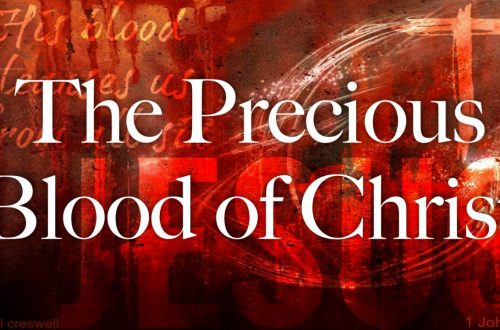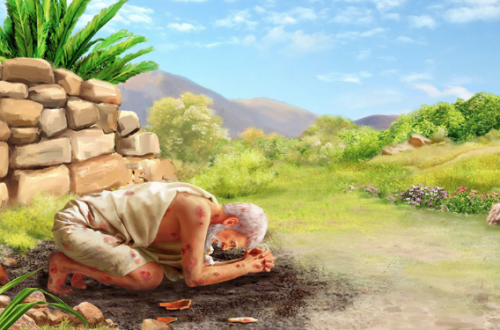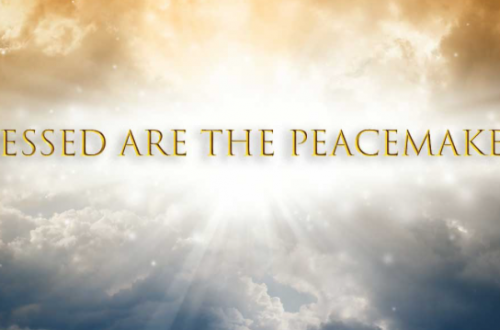Coming to terms with the brevity of life
Psalm 90:1–12 is part of the lectionary readings for the twenty-first Sunday after Pentecost, which is October 25th. The ode is regarded as a communal lament, that is, a hymn initially composed to express the grief and sorrow of God’s people over a distressing circumstance.
The precise nature and cause of the anguish remains unknown, being sketched only in the broadest of terms. Some conjecture that while the poem contains some ancient stylistic elements, it still is a literary mixture that was created in Israel sometime after the nation’s exile into Babylon.
In contrast, conservative Bible scholars think there is sufficient evidence to support the historical association of Moses to Psalm 90. If so, then toward the end of the Israelites’ 40-year period of wandering in the desert, the great lawgiver, intercessor, and advocate of God’s people reflected on the brevity of human life, especially against the backdrop of the Lord’s eternal existence.
In the Hebrew text of Psalm 90, the heading likewise identifies the poem as a “prayer of Moses” (17:1; 72:20; 86:1; 102:1; 142:1). Because of the Mosaic authorship of Psalm 90, it is the oldest datable song in the Hebrew Psalter.
Along with the title to Psalm 90, Moses is mentioned eight times in the Hebrew book of prayers. These and other related biblical references provide a glimpse into the life and times of the famed lawgiver. This information, in turn, paints a broader historical context to better understand the lament he authored.
Beginning with 77:20, the Psalter notes that God led His people out of Egypt like a shepherd would guide a flock of sheep. Also, He chose Moses and Aaron to oversee the procession.
In 99:6, these two are said to be among the Lord’s “priests.” This translates a Hebrew noun that refers to those whom God appointed to act as intermediaries for His people, especially in times of national distress.
According to 103:7, God revealed His ways to Moses. This included His benevolent character, upright statutes, redemptive plans, and saving acts.
Exodus 33 indicates that Moses regularly communed with the Lord in the “tent of meeting” (v. 7). Whenever Moses entered it, a “pillar of cloud” (v. 9) came down onto the tent. Inside, God spoke to Moses “face to face” (v. 11), that is, in the direct manner someone would converse with a “friend.”
Given the preceding information, it makes sense that the heading to Psalm 90 would call Moses the “man of God,” that is, a person who was inspired by the Lord and who represented hope and faithfulness to the Israelites. At times, this title was used in the Old Testament as a designation for a true prophet (Deut. 33:1; Josh. 14:6; 1 Sam. 2:27; 9:6, 9–10; 1 Kings 13:1; 17:24; 2 Kings 4:9; 1 Chron. 23:14; Ezra 3:2). Psalm 105:26 refers to Moses as the Lord’s “servant,” which indicates that the lawgiver was a member of God’s royal administration.
Psalm 90 contrasts the eternal existence of God and the mortality of people. The fragility and transience of humankind is brought into sharp relief through a variety of chronologically-oriented terms and phrases, including “years,” “day,” “our days,” “watch in the night,” and “morning.”
The Lord’s decision to consign an entire generation of Israelites (including Moses) to wander for 40 years and then die in the Sinai desert mirrors the hardship and anguish that typifies the broader human experience. The godly recognize that ultimately life is fleeting and largely undermined by the presence of decay and death throughout creation (Rom 8:20–22).
Moses opened Psalm 90 with the affirmation that throughout each and every generation, the Lord has been the “dwelling place” (v. 1) of His people. The underlying Hebrew noun can also be rendered as “habitation” or “refuge” (71:3).
Metaphorically speaking, God is like an oasis in the desert around which the faithful encamp. Also, in a sense, the Lord has been and always will be the place of safety for His people and the one who protects them from all sorts of danger (91:9).
Moses revealed that the Lord brought the mountains into existence and enabled them to pierce through the earth’s crust and dominate its landscape (Ps. 90:2). The Israelites regarded the mountains, which God created, as being the most ancient and abiding part of the planet.
The Hebrew noun that is rendered “everlasting” in connection with God denotes an unlimited duration of time. Its repetition in verse 2 stresses the profound truth that before the mountains and the earth were ever created, the Lord eternally preexisted (Pss. 93:2; 145:13; Isa. 40:28; Jer. 10:10; Rev. 1:8).
The one who created the earth and all its inhabitants is also the supreme Lord. Genesis 2:7 says that He formed the first human being “from the dust of the ground.” Then He breathed into the man’s nostrils the “breath of life.”
In an ironic turn of justice, the same creature who dared to transgress God’s command was consigned to die. As 3:19 relates, the great King created Adam from the soil—the “dust” of the earth—and in death he would yield his remains to the soil. Romans 5:12 reveals that because of Adam’s transgression, sin entered the world and brought the curse of death to the human race and all creation.
Psalm 90:3 refers to the same sentence of death, which hangs over everyone like an ominous storm cloud. All it takes is God’s simple command to end the lives of His mortal creatures. At the Creator’s directive—“return to dust”—humankind’s brief existence suddenly ends.
The Hebrew noun that is rendered “dust” points to material that has been pounded, crushed, or pulverized. The prime example of God’s judgment is seen in the faithless generation of Israelites, whose miserable end was to return to the arid soil of the Sinai desert after spending 40 years aimlessly wandering in it (Num. 13–14).
Much of what took place during those dreary decades is passed over without comment in the biblical record. Undoubtedly, there was not much of significance that occurred in relation to the advancement of God’s program of redemption.
The Hebrews would have traveled from one place to the next. They would have established camp wherever they could find adequate amounts of water and possibly meager amounts of vegetation.
Of course, the Lord kept the people alive by His generous provision of manna. Perhaps now and then over those long years, the covenant community would circle its way back to Kadesh Barnea, the spot where they had first rebelled against God (Deut 2:14).
Mere mortals cannot begin to fathom the truth that to the everlasting God a thousand years are as fleeting as a single day and as momentary as yesterday after it has quickly passed (Ps 90:4). The ancient Israelites divided their days into two 12-hour periods—day and night, respectively. Furthermore, depending on the season of year, God’s people divided the night into three or four equal periods of three to four hours.
Nighttime watching was an important profession in ancient Israel. In the cities, men posted on walls and towers were given the responsibility to sound the alert if danger appeared either inside or outside the city. In rural areas, watchmen would spend the night in towers to prevent theft from field or flock.
Moses stated that to the Lord an entire millennium seems as short-lived as a night watch (2 Pet 3:8). More generally, God’s knowledge of time and eternity is instantaneous, simultaneous, exhaustive, and absolutely correct. He is always aware of everything that occurs, regardless of whether it is past, present, or future.
The Hebrew of Psalm 90:5 can be rendered as “You flood them with sleep” or “you bring them to an end with sleep.” Perhaps the imagery is that of a torrent of water that devastates everything in its path, whether animate or inanimate. In the end, nothing survives the onslaught of the deluge.
Against the backdrop of God’s eternal preexistence, mere mortals last no longer than a dream. Suddenly, the years of their lives are engulfed and swept away by “death.”
Moses also used the analogy of tender grass that sprouts up at daybreak to represent the potential of youth. In the coolness of the dawn, it glistens and bursts into bloom. Yet, by dusk, the grass has dried up and withered in the unrelenting heat of the sun (v. 6).
For Moses and his peers, the arid climate of the Sinai desert at times must have felt this way. More generally, the existence of every living entity—including human beings—is just as ephemeral and cursory (Pss 102:25–28; 104:29–30; 144:3–4; 129:6; Isa 40:6–8; Jas 1:10–11; 1 Pet 1:24–25).
Psalm 90:7 vividly refers to God’s anger wiping out the lives of people through the incessant onslaught of death. The Hebrew verb that is rendered “consumed” denotes something that has wasted away, failed, or perished.
The noun that is translated “anger” literally refers to the nose or nostrils of the face. The image is that of a snorting sound that is produced by intense annoyance or dissatisfaction over some circumstance. With respect to the Lord, His anger is an expression of His righteous indignation over humanity’s sins, including those involving His chosen people (2:5; 7:11; 39:11).
The second part of 90:7 completes the thought begun in the first part. When people experience God’s “wrath,” they are “terrified.” The first term renders a Hebrew noun that denotes the hot displeasure associated with God’s indignation.
“Terrified” renders a verb that draws attention to the alarm and anxiety that people feel. In a manner of speaking, they are overwhelmed by the Lord’s fury, which brings about their demise.
It is easy for people to imagine that no one knows about transgressions they commit in their heart, such as greed, arrogance, and resentment. Yet, before the penetrating light of God’s holy presence, nothing is hidden from His sight.
Moses depicted the Lord as spreading out our “guilty deeds” (v. 8) before Him. Every form of mischief is transparent and all our perversities are exposed.
Even the sins people try to hide are ever-present before the light of God’s countenance. In a manner of speaking, the Creator’s face is comparable to a lamp that dispels the surrounding darkness to reveal what would otherwise remain hidden (Matt 10:26; Mark 4:22; Luke 8:17; 12:2; John 3:19–21).
In Psalm 90:9, the Hebrew verb that is rendered “pass away” conveys the image of something that is moribund and close to dying. Under the glare of the Lord’s gaze and the heat of His raging fury, a person’s existence withers and feels as if it is cut short prematurely.
Life itself tends to be filled with unending struggles, which cripple the ability of people to deal with a successive series of afflictions. At the end of countless misfortunes, weary earthbound travelers end their pain-filled years with a groan. The noun that is rendered “sigh” can also denote the transience of life, which passes away all too quickly.
Such a perspective is often lost on youth, for whom seven or eight decades of life seem like a long time. In antiquity, seven and “seventy” (v. 10) epitomized completion and perfection.
The parallel construction of verse 10 reinforces the preceding impression with the observation that some people, due to their God-given strength, live to be 80 years old. Even more impressive is the fact that the span of Moses’ life reached 120 years. Indeed, Deuteronomy 34:7 notes that the eyesight of the lawgiver was still good, and his body remained strong.
All the same, Moses did not escape death. Likewise, it does not matter how long people might live. Against the backdrop of God’s eternal existence all the days of their life are few and fleeting.
The focus in verse 10 is on the prime of life, when young people are filled with confidence at what they imagine they can accomplish in their zeal and strength. Yet, even the best years of their life are scarred by “trouble and sorrow.” The more literal rendering is “destruction and wickedness,” which points to the grief, disappointment, and loss that typifies human existence.
After a lifetime of toil and heartache, one’s existence suddenly ends. Moses compared the abrupt onslaught of death to a bird that quickly flies away when scared from its nest.
Moses wanted the covenant community to recognize that life’s afflictions and brevity were manifestations of God’s judgment on sin (v. 11). The lawgiver admitted that no one, regardless of how wise and informed he or she might be, has ever fathomed the full extent of the Creator’s anger or even the duration of its intensity and severity.
The second half of verse 11 is literally rendered “and like your fear is your wrath”. The Hebrew noun rendered “fear” denotes a reverential trust in the Lord that is the basis for His people knowing Him, doing His will, and fully appreciating His unfailing love (Pss 111:10; 147:11; Prov 1:7).
One possible meaning is that God’s wrath causes humans to fear Him. Another likely sense is that the awesomeness of God’s raging fury mirrors the fear He deserves to receive from human beings.
More generally, as mortals experience God’s righteous indignation, it should prompt them to think seriously about the brevity of life. In Psalm 39, David prayed that God would help His bondservant more fully appreciate the transient nature of his existence (v. 4).
The Lord had made the span of David’s life seem no longer than the width of his hand. Indeed, the entire extent of his earthly sojourn was a fleeting moment to God. For that matter, to Him the lifetime of every human being—even those who seemed secure—was but a vapor (v. 5).
From the perspective of the eternal Lord, people were as impermanent as shadows. So, all their hustle and bustle to amass what they could not keep seemed futile (v. 6).
If mortals were wise, they would recognize their accountability to God for everything they did while on earth. In contrast, those who were morally deficient would, in their arrogance, foolishly disregard the swift passage of time and their God-given responsibility to worship and serve the Lord (73:4–12; 92:6–7; 94:8–11).
Against the above theological backdrop, Moses petitioned God to teach the covenant community to “number [their] days” (90:12). The idea is that in becoming more aware of how short existence really is, God’s loyal followers would value the time He has given them, recognize it as His gracious gift to them, and seek to accomplish His will.
The prudent, as a result of being so inclined, obtain a “heart of wisdom.” The Hebrew noun that is rendered “heart” denotes the center of a person’s thoughts, will, and ethical character. The noun that is translated “wisdom” refers to God-given prudence in all areas of life.
Together these terms point to those who astutely use all the allotted time they have on earth to bring glory to the Lord. To repeat the words of 39:4, “Help me understand, O Lord, my mortality, and the brevity of my life. Help me to realize how quickly my life will pass.”
Key ideas to contemplate
An entire generation of Israelites perished in the Sinai desert because of their rebellion against God. Even Moses, the nation’s great lawgiver, failed to enter the promised land because at one point he too failed to do God’s will. We learn from Moses’ gloomy observations in Psalm 90 that our sins can have tragic, life-altering consequences.
1. The reality of death. Everyday people throughout the world experience the brevity and impermanence of their earthly existence. Their physical and mental capabilities, which might have held tremendous promise earlier in their lives, diminish and ebb away with the passing of years and decades.
The above is a consequence of God’s judgment of sin in the human race and throughout the universe. A testament to this truth is the monotony and misery the Israelites experienced while wandering in the wilderness, only thereafter to be greeted by death (Deut 4:25–28; 11:16–17).
2. The moral decline of society. As with the ancient Israelites, modern Western societies have moral standards that are no longer God’s but our own. The consequences of this trend are clearly visible.
We have been losing respect for human life. “Right” has started to become anything that a person can get away with. Any social practice is becoming acceptable as long as it doesn’t hurt anyone.
3. The certainty of future judgment. God’s moral standards are absolute. Furthermore, His ethical norms never change. Indeed, one day He will judge the nations.
Jesus referred to the preceding event as a separation of the sheep from the goats, with the sheep receiving eternal life and the goats eternal punishment (Matt. 25:31–46). When people face God’s judgment, the slogan “I only did what everyone else was doing” will fail to be a valid defense.
4. The need for self-examination. Throughout Israel’s history, God’s people refused to listen to His call to acknowledge their sins, receive His forgiveness, and change their lives. We, too, need to examine ourselves and receive forgiveness for personal sin.
The basis for the Creator’s declaration of pardon is Jesus’ atoning sacrifice at Calvary. In light of our experiencing the Father’s grace through faith in the Son, we should reevaluate and, if necessary, adjust our life priorities to reflect the wisdom recorded in Scripture (Ps 90:12).
Tags: Psalm 90, life, death, divine judgment




